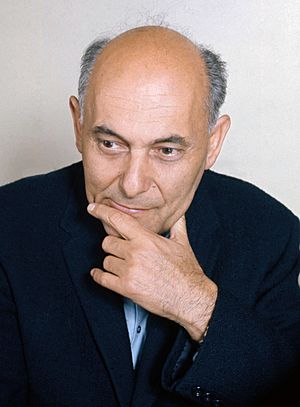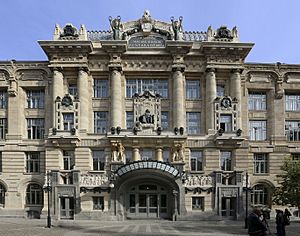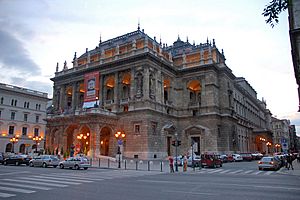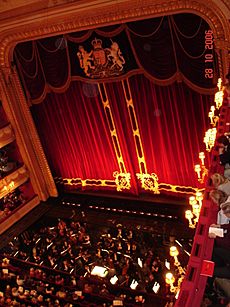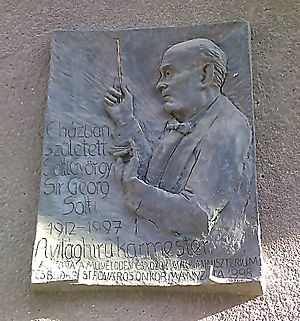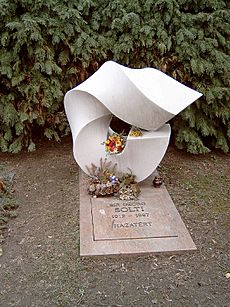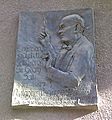Georg Solti facts for kids
Sir Georg Solti (born György Stern; October 21, 1912 – September 5, 1997) was a famous Hungarian-British music conductor. He was known for leading opera companies in cities like Munich, Frankfurt, and London. He also served for a long time as the music director of the Chicago Symphony Orchestra.
Born in Budapest, Hungary, Solti studied music with famous composers like Béla Bartók. In the 1930s, he worked at the Hungarian State Opera House and helped the great conductor Arturo Toscanini at the Salzburg Festival. His career was stopped by the rise of the Nazis. Because he was Jewish, he had to leave Hungary in 1938 to escape harsh anti-Jewish laws. After conducting a ballet season in London, he found safety in Switzerland, where he stayed during World War II. He wasn't allowed to conduct there, so he worked as a pianist.
After the war, Solti became the music director of the Bavarian State Opera in Munich in 1946. In 1952, he moved to the Oper Frankfurt, where he led for nine years. He became a German citizen in 1953. In 1961, he took over as music director of the Covent Garden Opera Company in London. During his ten years there, he made many improvements that raised the company to a top international level. The company was even given the special title "the Royal Opera" because of its high standards. He became a British citizen in 1972.
In 1969, Solti became the music director of the Chicago Symphony Orchestra, a job he held for 22 years. He made many recordings and led the orchestra on important international tours. Solti stepped down from this role in 1991 but remained the orchestra's music director laureate until he passed away. While in Chicago, he also led the Orchestre de Paris (1972–1975) and the London Philharmonic Orchestra (1979–1983).
Solti was known for his intense and powerful music in his early career. Later, he became more relaxed as a conductor. He was a very busy recording artist, making over 250 recordings, including 45 complete operas. His most famous recording is probably Decca's full set of Wagner's Der Ring des Nibelungen, recorded between 1958 and 1965. This recording has twice been voted the greatest recording ever made by music magazines. Solti won many awards throughout his career, including 31 Grammy Awards, making him the most-awarded artist in Grammy history until 2023.
Contents
Georg Solti's Musical Journey
Growing Up and Discovering Music
Solti was born György Stern in Budapest, Hungary. He was the younger of two children, and both his parents were Jewish. After World War I, many people in Hungary with German-sounding names changed them to Hungarian ones. His father changed the children's last name to Solti, after a small town in Hungary.
Solti's mother came from a musical family and encouraged him to play the piano. He wasn't always keen on practicing, saying, "what ten-year-old wants to play the piano when he could be out playing football?"
At age ten, Solti enrolled in a music school in Budapest. Two years later, he moved to the more famous Franz Liszt Academy of Music. When he was 12, he heard Beethoven's Fifth Symphony conducted by Erich Kleiber. This inspired him to become a conductor. His parents couldn't afford years of music lessons, so from age 13, Solti paid for his studies by giving piano lessons.
At the Franz Liszt Academy, Solti studied with famous Hungarian musicians like Béla Bartók (for piano), Leó Weiner (for chamber music), and Ernő Dohnányi (for composition).
From Piano to Podium
After graduating in 1930, Solti joined the staff of the Hungarian State Opera House. He worked as a répétiteur, which meant coaching singers and playing piano for rehearsals. He found this work very helpful for his dream of becoming a conductor.
In 1937, he became an assistant to the legendary conductor Arturo Toscanini at the Salzburg Festival. This experience greatly boosted his reputation.
Solti got his first chance to conduct an opera on March 11, 1938. It was Mozart's The Marriage of Figaro. That same evening, news arrived that Germany had invaded Austria. Many Hungarians worried Hitler would invade Hungary next. While that didn't happen, Hungary's government, to please the Nazis, passed anti-Jewish laws. Solti's family urged him to leave.
He first went to London, where he conducted for a Russian ballet season at the Royal Opera House. Around this time, he changed his first name from "György" to "Georg."
After London, Solti went to Switzerland. He couldn't get a work permit as a conductor there, so he taught piano. In 1942, he won the Geneva International Music Competition for piano, which allowed him to give piano recitals. He stayed in Switzerland throughout World War II. In 1946, he married Hedwig (Hedi) Oeschli.
Leading Operas in Germany
After the war, Solti's career changed quickly. In 1946, he was named music director of the Bavarian State Opera in Munich. This was a huge job for a young conductor, but many leading German conductors were not allowed to work yet due to their past connections with the Nazi regime. Under Solti, the company rebuilt its performances and regained its fame. He even received encouragement from the elderly composer Richard Strauss.
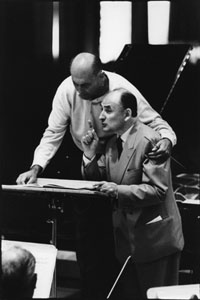
In 1946, Solti also signed a recording contract with Decca Records. His first recording as a conductor was in 1947. His recording career really took off after 1956, when John Culshaw became head of Decca's classical recordings. Culshaw believed Solti was a great conductor and wanted him to record Wagner's famous Der Ring des Nibelungen operas. The first of these, Das Rheingold, was a huge success, making Solti internationally famous.
In 1952, Solti moved to Frankfurt to become the music director of the Oper Frankfurt. The city's opera house had been destroyed in the war, and Solti helped build a new company and repertoire for its new building. He stayed in Frankfurt from 1952 to 1961, conducting 33 operas. In 1953, he became a German citizen.
During his time in Frankfurt, Solti also conducted in other places. He made his first appearances in the Americas in 1952 and debuted at the Edinburgh International Festival. In 1954, he conducted at the Glyndebourne Festival. That same year, he first conducted the Chicago Symphony Orchestra. In 1960, he made his debut at the Metropolitan Opera in New York.
Making London's Royal Opera Shine
In 1961, Solti became the music director of the Covent Garden Opera Company in London. He had initially turned down the job because he wasn't sure he wanted another opera position after 14 years in Germany. However, the famous conductor Bruno Walter convinced him it was his duty to take on the role.
When Solti started at Covent Garden, some people were worried he might move away from the company's tradition of performing operas in English. However, Solti supported performing in the local language and helped British and Commonwealth singers grow within the company.
Solti faced some challenges early on, including criticism from a small group in the audience. But he insisted on changes, like strengthening the chorus and orchestra. He also introduced a new system for scheduling performances to improve musical and dramatic quality. By 1967, The Times newspaper noted that Covent Garden was now considered equal to the best opera houses in the world.
Solti's demanding rehearsal style earned him the nickname "The Screaming Skull." Despite this, under his leadership, the company reached international fame. In 1968, Queen Elizabeth II gave the company the special title "the Royal Opera." By the end of his ten years there, Solti had conducted 33 operas by 13 composers.
In 1967, Solti married Valerie Pitts, a British television presenter. They had two daughters.
Leading the Chicago Symphony
In 1967, Solti was invited to become the music director of the Chicago Symphony Orchestra. He accepted, sharing the conducting duties with Carlo Maria Giulini for the first few years.
The orchestra was talented but needed a boost. Solti decided it was important to raise its international profile. He made sure the orchestra was used for many of his Decca recordings. In 1971, he and Giulini led the orchestra on its first European tour, playing in ten countries. The orchestra received great praise from European critics and was welcomed home with a parade.
Musicians in the orchestra noted Solti's constant efforts to improve his own conducting. He even tried conducting without a baton to get a different sound from the players.
Solti greatly expanded the orchestra's music choices. Under him, the Chicago Symphony performed complete cycles of symphonies by Bruckner and Mahler for the first time. He also introduced new works commissioned for the orchestra, including pieces by Lutosławski and Tippett.
Solti's recordings with the Chicago Symphony included complete symphonies by Beethoven, Brahms, Bruckner, and Mahler. He also recorded several operas with them, such as Wagner's Der fliegende Holländer and Beethoven's Fidelio.
After stepping down as music director in 1991, Solti continued to conduct the orchestra. He conducted 999 concerts with them. His 1,000th concert was planned for October 1997, but he passed away that September.
Final Years and Lasting Legacy
Besides his time in Chicago, Solti was also music director of the Orchestre de Paris from 1972 to 1975. From 1979 to 1983, he was the principal conductor of the London Philharmonic Orchestra. He continued to explore new music. With the London Philharmonic, he performed and recorded many major works by Elgar. Later in his career, he became very interested in the music of Shostakovich, recording seven of his symphonies.
In 1983, Solti conducted at the Bayreuth Festival for the only time. He preferred traditional productions of Wagner's operas. His conducting was praised, but some performances were affected by singers' illnesses.
In 1991, Solti worked with actor and composer Dudley Moore on an eight-part TV series called Orchestra!, which aimed to introduce people to the symphony orchestra. In 1994, he led a training workshop for young American musicians at Carnegie Hall. The next year, to celebrate the 50th anniversary of the United Nations, he formed the World Orchestra for Peace, made up of 81 musicians from 40 nations. This orchestra still performs today.
Solti often returned to Covent Garden as a guest conductor, always receiving a warm welcome. From 1972 to 1997, he conducted ten different operas there. On July 14, 1997, he conducted the last operatic music heard in the old Royal Opera House before it closed for rebuilding. The day before, he conducted what would be his last symphony concert, Mahler's Fifth Symphony, with the Zurich Tonhalle Orchestra, the same orchestra he made his first recording with 50 years earlier.
Sir Georg Solti passed away peacefully in his sleep on September 5, 1997, while on holiday in France. He was 84 years old. After a state ceremony in Budapest, his ashes were buried next to those of composer Béla Bartók.
His Famous Recordings
Solti recorded throughout his career for Decca Records. He made over 250 recordings, including 45 complete opera sets. He was one of the first conductors to become famous through his recordings before being widely known in concert halls or opera houses.
Solti's most celebrated recording is Wagner's Der Ring des Nibelungen, made in Vienna between 1958 and 1965. This recording has been voted the greatest recording ever made twice by music critics and readers. It is even featured in the film Apocalypse Now during a helicopter attack scene.
Awards and Tributes
Solti received many honors. He was made an honorary CBE in 1968 and an honorary knight (KBE) in 1971 by the British government. When he became a British citizen in 1972, his knighthood became official, and he was known as Sir Georg Solti. He also received honorary citizenship from Castiglione della Pescaia, a coastal town in Italy where he had a holiday home. The Georg Solti Accademia and a main square in the town are named after him. He received many other honors from countries like Austria, France, Germany, and the US.
In 1987, a bronze bust of Solti was placed in Lincoln Park, Chicago, to celebrate his 75th birthday. In 2006, it was moved to a new Solti Garden in Grant Park, near Orchestra Hall. In 1997, the street next to Symphony Center in Chicago was renamed "Sir Georg Solti Place" in his memory.
Solti won many recording industry awards, including 14 Grand Prix Mondial du Disque awards and 31 Grammy Awards. He held the record for the most Grammy wins of all time until 2023. In 2007, ten years after his death, Decca released a recording of his final concert.
After Solti's death, his wife and daughters created the Solti Foundation to help young musicians. His life was also shown in a 1997 film called Sir Georg Solti: The Making of a Maestro.
In 2012, events called "Solti @ 100" were held to mark 100 years since his birth. These included concerts and exhibitions in New York, Chicago, London, and Vienna. That same year, Solti was inducted into the Gramophone "Hall of Fame."
The Sir Georg Solti International Conductors' Competition, held every two years in Frankfurt, is named in his honor.
Images for kids
See also
 In Spanish: Georg Solti para niños
In Spanish: Georg Solti para niños
 | Selma Burke |
 | Pauline Powell Burns |
 | Frederick J. Brown |
 | Robert Blackburn |


